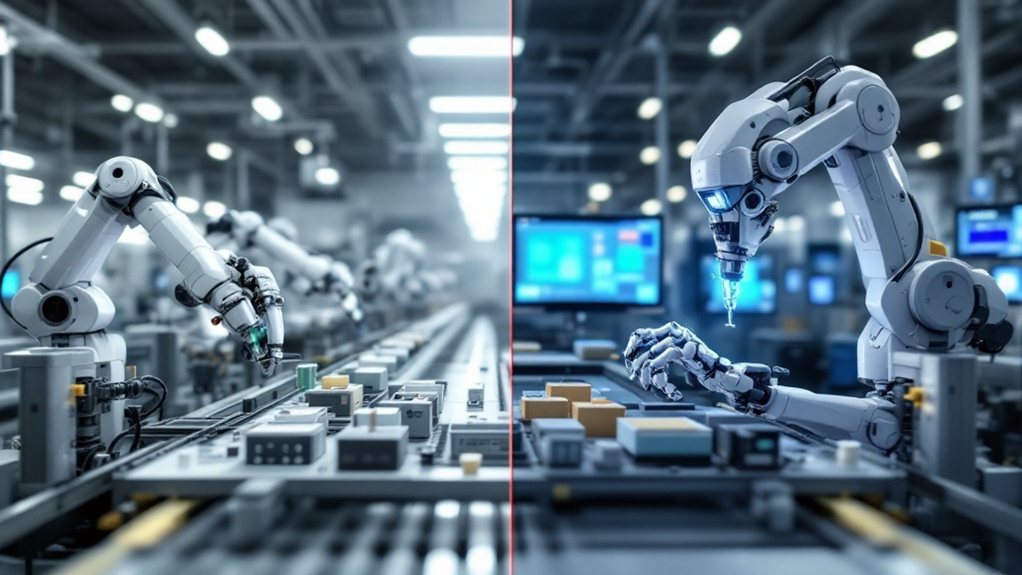AI and automation are totally different beasts. Automation is like a reliable worker bee, mindlessly following exact rules to complete repetitive tasks. AI, on the other hand, thinks more like a human – it learns, adapts, and sometimes throws curveballs at its creators. While automation sticks to its lane, AI can handle messy data, spot hidden patterns, and tackle complex problems. The real magic happens when these technologies join forces.

Despite what many people think, artificial intelligence and automation are not the same thing – not even close. While automation is like that reliable but somewhat dim colleague who does the same task over and over without complaint, AI is more like that annoyingly smart coworker who keeps learning new tricks and showing off. Automation follows rules. Period. AI, on the other hand, learns, adapts, and sometimes even surprises its creators with unexpected solutions.
Let’s get technical for a moment. AI operates through complex algorithms and machine learning, simulating human-like thinking processes. It can handle messy, unstructured data and make decisions based on patterns it discovers. Narrow AI solutions like Siri and ChatGPT focus on performing specific designated functions without consciousness.
AI thinks like us but better – crunching messy data and finding hidden patterns through sophisticated algorithms and machine learning.
Automation? It’s more straightforward. It follows pre-programmed instructions without deviation – perfect for assembly lines and filling out forms, but don’t expect it to write poetry or recognize your aunt in a family photo. The beauty of automated systems is that they can work 24/7 without fatigue. Companies like GE and Honeywell demonstrate this by using predictive maintenance systems to keep their manufacturing operations running smoothly.
The applications tell the real story. AI is the show-off that’s everywhere – analyzing market trends, processing natural language, even diagnosing diseases. Automation sticks to what it knows best: manufacturing, repetitive office tasks, and other predictable processes. Sure, automation is essential, but it’s not exactly winning any innovation awards.
Here’s where things get interesting. When these technologies team up, magic happens. AI-powered automation is like giving your reliable but boring colleague a genius upgrade. Suddenly, those repetitive tasks become smarter, more adaptable, and remarkably more efficient.
Organizations can finally stop wasting human talent on mind-numbing tasks and focus on work that actually requires human creativity and emotional intelligence.
Looking ahead, both technologies will continue shaping how we work, but in different ways. AI will keep pushing boundaries and transforming industries in ways we probably can’t even imagine yet. Automation will keep doing what it does best – making processes more efficient and consistent. Together, they’re not just changing the game; they’re creating an entirely new one. And let’s be honest – that’s pretty exciting stuff.
Frequently Asked Questions
How Much Does It Cost to Implement AI Versus Traditional Automation Systems?
AI implementation hits the wallet hard upfront – we’re talking $10,000 to six figures for custom solutions.
Traditional automation? Way cheaper to start.
But here’s the twist: AI’s long-term costs often drop thanks to its self-improving nature.
Traditional systems keep chugging along at the same cost, needing manual updates and reprogramming.
Cloud services help cut those hefty AI infrastructure costs, though.
Can AI and Automation Work Together in Small Business Settings?
AI and automation absolutely work together in small businesses – it’s like peanut butter and jelly.
AI handles the smart stuff, learning and adapting, while automation tackles repetitive tasks. Together, they create a powerful combo.
Small businesses use them for everything from customer service chatbots to inventory management.
Sure, there are challenges with cost and implementation, but when done right, it’s a game-changer for efficiency and growth.
What Security Risks Are Associated With AI Compared to Standard Automation?
AI security risks pack more punch than basic automation threats – it’s not even close.
While automation faces standard system vulnerabilities, AI deals with sneakier problems like data poisoning and model manipulation.
AI’s complex nature makes it a juicier target for hackers. Plus, its black-box decision-making can mask security breaches.
Traditional automation? More straightforward, more predictable, less likely to go rogue.
How Long Does It Take to Train Employees on AI Systems?
Training time for AI systems varies dramatically – from a few days to several months.
Basic operational training? Maybe a week. Complex AI integration? That’s a whole different ballgame.
It really depends on the system’s complexity and the employee’s role. Some folks get it quickly, others… not so much.
Companies often need ongoing training programs since AI keeps evolving.
No one-size-fits-all here, folks.
Which Industries Are Most Resistant to Both AI and Automation Adoption?
Manufacturing, agriculture, construction, mining, and procurement consistently show the strongest resistance to AI and automation adoption.
Legacy equipment costs a fortune to upgrade, and workers aren’t exactly thrilled about robots taking their jobs.
Mining’s harsh environments make AI unreliable, while agriculture still needs human judgment for unpredictable conditions.
Construction remains stubbornly human-centric, with AI relegated to basic planning tasks.









